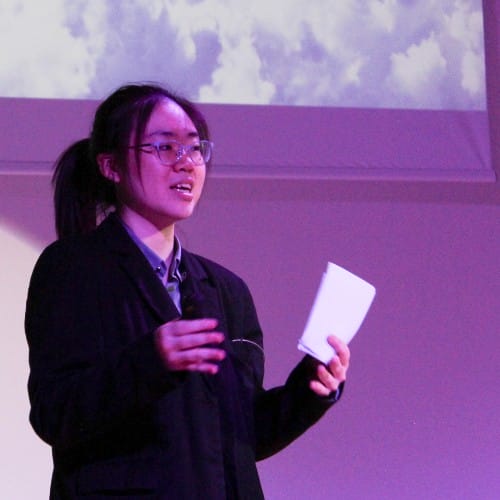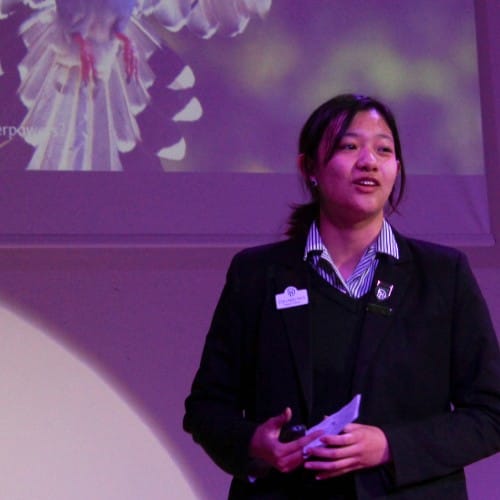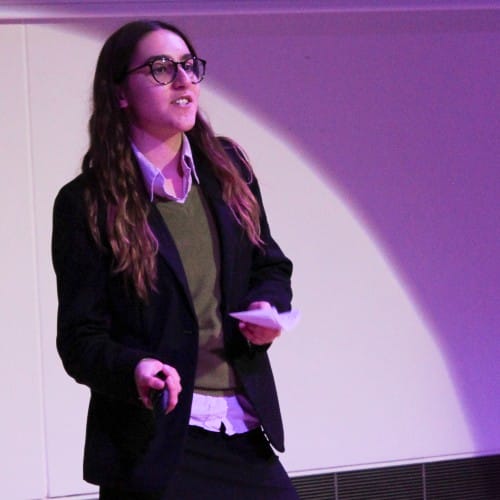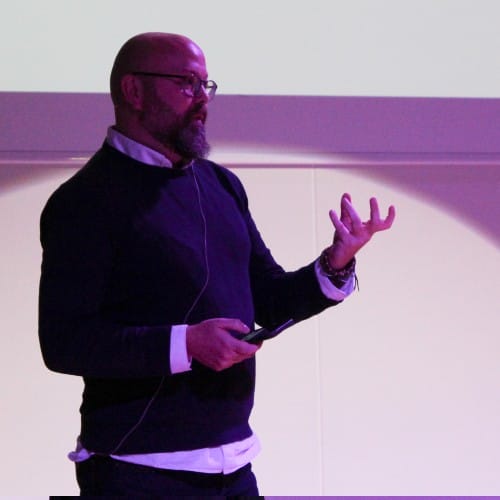
The event was the culmination many weeks of researching and preparations for the eight students, all studying STEM subjects at A Level. The super-curricular STEM Shorts initiative, organised by our Head of STEM, Mr Charlie Littledale, is based on the successful format of TED Talks. The students were challenged to research, prepare and deliver a 5-minute talk that would be accessible to anyone on topics of personal interest – linked to the theme of “Modern-day problems that can be solved through inspiration from nature.”
The audience was treated to a diverse range of talks across the STEM disciplines on such topics as CRISPR-Cas9, polyculture, the future of analgesics, the science of superpowers, using fractals to enhance CGI and much more.
We were also delighted to be joined at this inaugural STEM Shorts event Dr Richard James MacCowan, who gave a fascinating talk on ‘Biomimicry and how nature can provide a wealth of solutions for the modern world’. Richard is an internationally renowned speaker on biomimicry, innovation and sustainability from cosmetics through to superyacht design, and he stayed to hear the pupil’s presentations.




The evening was a resounding success, and all credit must go to our student presenters who found marvellous ways of simplifying complex ideas and technologies so that they were accessible for all.
Katie, who presented on ‘analgesic drugs’, said: “I really enjoyed the event and the journey to it was a fantastic opportunity for me, as I was able to research into a field I had previously scarce knowledge about. My chosen subject was painkillers, more specifically the mechanism of morphine. I learnt a lot in the process, including being selective about the infinite resources on the internet, and simplifying complex information to an understandable degree.
There was such a large variety of topics, from fractal dimensions to superpowers and polyculture farming, the event was exceptionally interesting and definitely inspiring for the audience about the different applications to advance scientific research.”
Clara, whose STEM Short explored the possibility of using ‘Quercitin on periodontitis’, also found the process of great value; “This event was a great opportunity to research further a topic that I was particularly interested in from a different angle and to look for new perspectives on trying to find solutions for it. It was also a great way to improve my public speaking and communication skills, and I really enjoyed hearing from academic fields that I would normally not encounter.”
Mr Charlie Littledale, Head of STEM, explained the rationale behind the initiative. “My aim for the STEM Shorts initiative is that those students involved not only enjoy delving much deeper into areas of interest to them personally, but also benefit hugely from the process. The skills they have developed of researching, condensing and simplifying information, as well as presenting under the pressure of a live audience, will stand them in good stead for the rigors of University interview processes, and the world of work in the future, where speaking confidently will be essential. Furthermore, my aim is always to inspire our students to want to become further engaged with STEM – and from what those in the audience tell me, we certainly achieved this aim. I hope to see many of them presenting their own STEM Shorts in years to come.”
The students involved deserve the greatest praise for their commitment to the process and for their fascinating and inspirational talks:
- Melinda L – Fractional dimensions
- Jade F – How can animal features make superpowers a reality?
- Clara D-D – Quercitin on periodontitis
- Louisa N – Polyculture Farming – How we can feed the world and empower communities while protecting nature
- Katie L – Analgesic drugs
- Ariel C – Medical applications of CRISPR/Cas9
- Yiming S – The wonders of spider silk
- Anya G – Nanozymes for biosensors
If you’re interested to find out more about STEM at Downe House, why not read our student-led STEM magazine Origins which can be found here on our ISSUU channel.
Tours & Open Mornings
The best way to find out more about Downe House is to experience it for yourself. Book a personal tour or join us at one of our Open Mornings, available throughout the year.
Discover